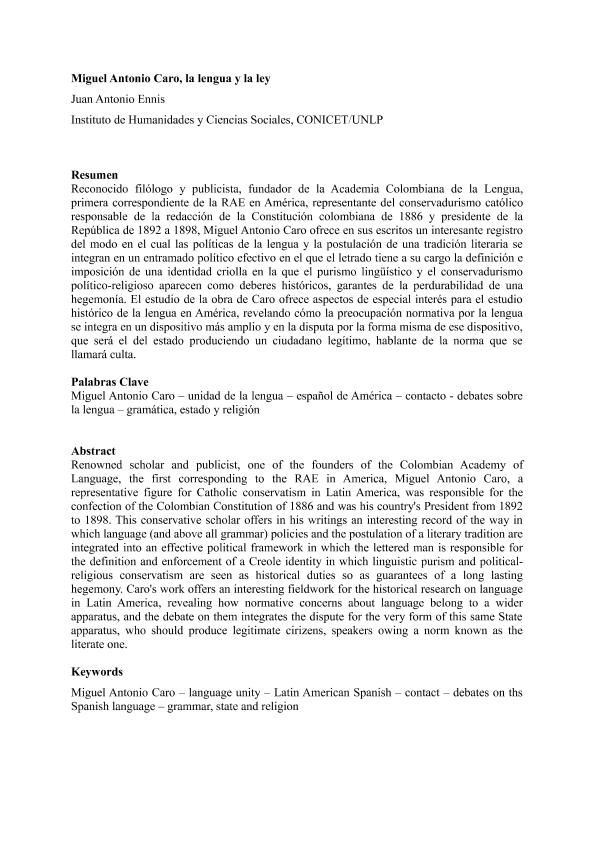Mostrar el registro sencillo del ítem
dc.contributor.author
Ennis, Juan Antonio

dc.date.available
2016-10-14T19:53:26Z
dc.date.issued
2013-12
dc.identifier.citation
Ennis, Juan Antonio; Miguel Antonio Caro, la lengua y la ley; Sociedad Argentina de Lingüística; RASAL Lingüística; 2012; 1; 12-2013; 27-39
dc.identifier.issn
2250-7353
dc.identifier.uri
http://hdl.handle.net/11336/7723
dc.description.abstract
Reconocido filólogo y publicista, fundador de la Academia Colombiana de la Lengua, primera correspondiente de la RAE en América, representante del conservadurismo católico responsable de la redacción de la Constitución colombiana de 1886 y presidente de la República de 1892 a 1898, Miguel Antonio Caro ofrece en sus escritos un interesante registro del modo en el cual las políticas de la lengua y la postulación de una tradición literaria se integran en un entramado político efectivo en el que el letrado tiene a su cargo la definición e imposición de una identidad criolla en la que el purismo lingüístico y el conservadurismo político-religioso aparecen como deberes históricos, garantes de la perdurabilidad de una hegemonía. El estudio de la obra de Caro ofrece aspectos de especial interés para el estudio histórico de la lengua en América, revelando cómo la preocupación normativa por la lengua se integra en un dispositivo más amplio y en la disputa por la forma misma de ese dispositivo, que será el del estado produciendo un ciudadano legítimo, hablante de la norma que se llamará culta.
dc.description.abstract
Renowned scholar and publicist, one of the founders of the Colombian Academy of Language, the first corresponding to the RAE in America, Miguel Antonio Caro, a representative figure for Catholic conservatism in Latin America, was responsible for the confection of the Colombian Constitution of 1886 and was his country's President from 1892 to 1898. This conservative scholar offers in his writings an interesting record of the way in which language (and above all grammar) policies and the postulation of a literary tradition are integrated into an effective political framework in which the lettered man is responsible for the definition and enforcement of a Creole identity in which linguistic purism and politicalreligious conservatism are seen as historical duties so as guarantees of a long lasting hegemony. Caro's work offers an interesting fieldwork for the historical research on language in Latin America, revealing how normative concerns about language belong to a wider apparatus, and the debate on them integrates the dispute for the very form of this same State apparatus, who should produce legitimate cirizens, speakers owing a norm known as the literate one.
dc.format
application/pdf
dc.language.iso
spa
dc.publisher
Sociedad Argentina de Lingüística
dc.rights
info:eu-repo/semantics/openAccess
dc.rights.uri
https://creativecommons.org/licenses/by-nc-sa/2.5/ar/
dc.subject
Miguel Antonio Caro
dc.subject
Español de América
dc.subject
Unidad de La Lengua
dc.subject
Gramática, Estado y Religión
dc.subject
Debates sobre La Lengua
dc.subject.classification
Estudios Generales del Lenguaje

dc.subject.classification
Lengua y Literatura

dc.subject.classification
HUMANIDADES

dc.title
Miguel Antonio Caro, la lengua y la ley
dc.type
info:eu-repo/semantics/article
dc.type
info:ar-repo/semantics/artículo
dc.type
info:eu-repo/semantics/publishedVersion
dc.date.updated
2016-09-19T18:41:00Z
dc.journal.volume
2012
dc.journal.number
1
dc.journal.pagination
27-39
dc.journal.pais
Argentina

dc.journal.ciudad
Buenos Aires
dc.description.fil
Fil: Ennis, Juan Antonio. Consejo Nacional de Investigaciones Científicas y Técnicas. Centro Científico Tecnológico la Plata. Instituto de Investigaciones En Humanidades y Ciencias Sociales; Argentina
dc.journal.title
RASAL Lingüística
Archivos asociados
